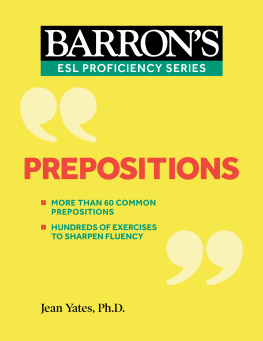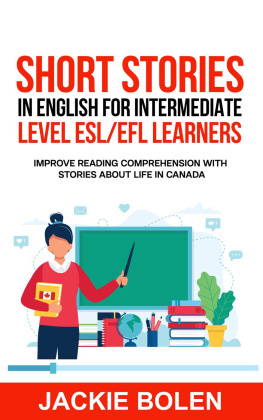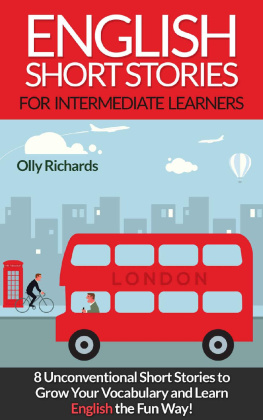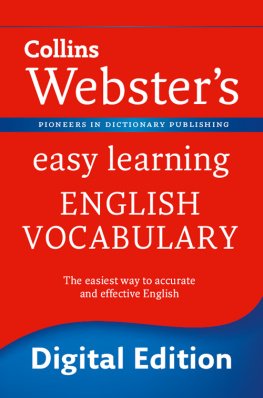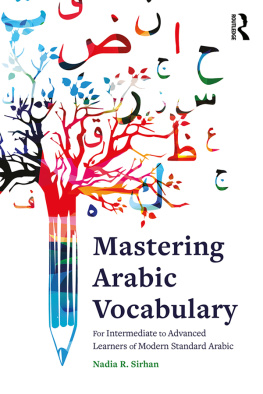Jean Yates - English Vocabulary for Beginning ESL Learners
Here you can read online Jean Yates - English Vocabulary for Beginning ESL Learners full text of the book (entire story) in english for free. Download pdf and epub, get meaning, cover and reviews about this ebook. year: 2017, publisher: McGraw-Hill Education, genre: Children. Description of the work, (preface) as well as reviews are available. Best literature library LitArk.com created for fans of good reading and offers a wide selection of genres:
Romance novel
Science fiction
Adventure
Detective
Science
History
Home and family
Prose
Art
Politics
Computer
Non-fiction
Religion
Business
Children
Humor
Choose a favorite category and find really read worthwhile books. Enjoy immersion in the world of imagination, feel the emotions of the characters or learn something new for yourself, make an fascinating discovery.

- Book:English Vocabulary for Beginning ESL Learners
- Author:
- Publisher:McGraw-Hill Education
- Genre:
- Year:2017
- Rating:4 / 5
- Favourites:Add to favourites
- Your mark:
- 80
- 1
- 2
- 3
- 4
- 5
English Vocabulary for Beginning ESL Learners: summary, description and annotation
We offer to read an annotation, description, summary or preface (depends on what the author of the book "English Vocabulary for Beginning ESL Learners" wrote himself). If you haven't found the necessary information about the book — write in the comments, we will try to find it.
English Vocabulary for Beginning ESL Learners — read online for free the complete book (whole text) full work
Below is the text of the book, divided by pages. System saving the place of the last page read, allows you to conveniently read the book "English Vocabulary for Beginning ESL Learners" online for free, without having to search again every time where you left off. Put a bookmark, and you can go to the page where you finished reading at any time.
Font size:
Interval:
Bookmark:
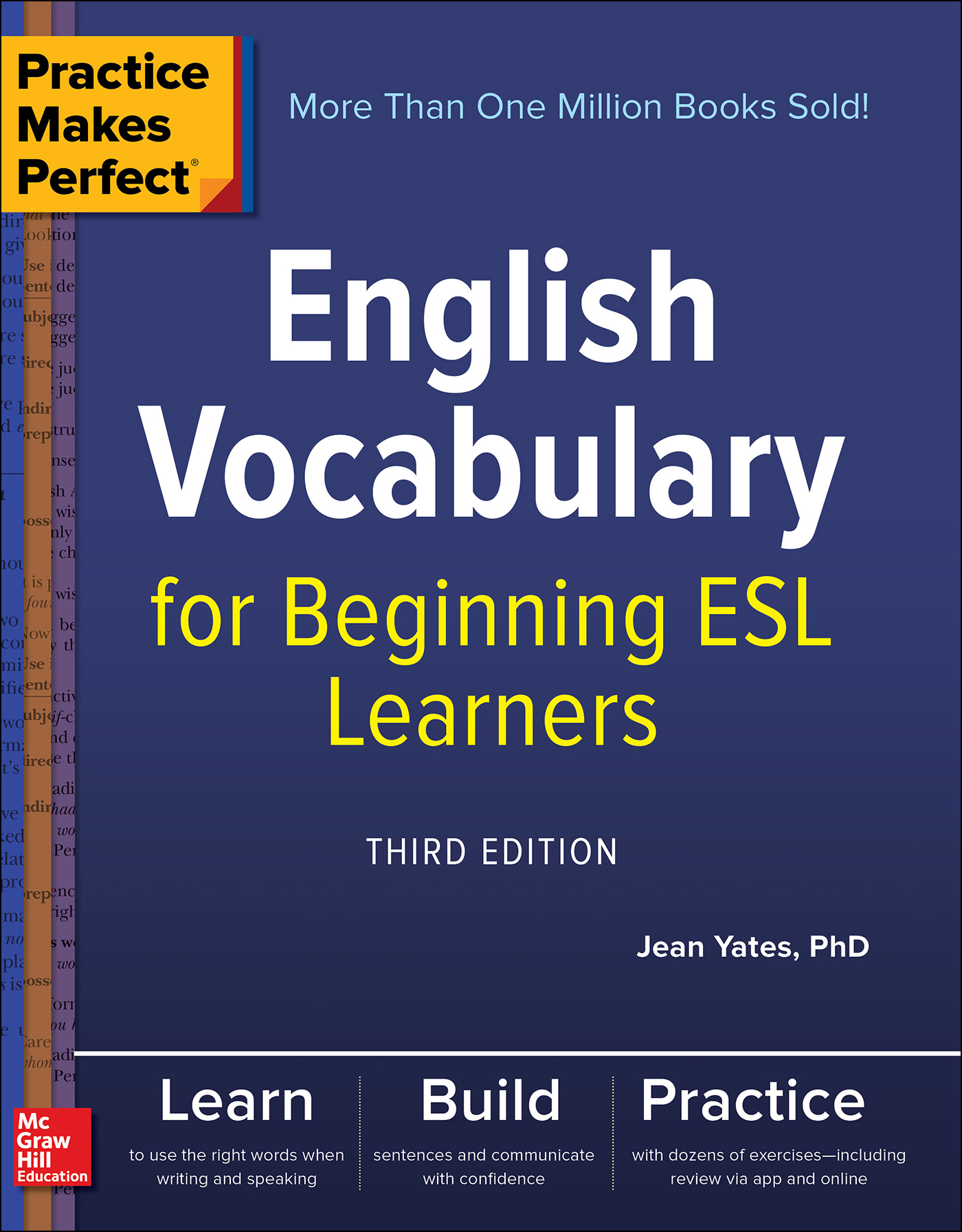
 Copyright 2017 by McGraw-Hill Education LLC. All rights reserved. Except as permitted under the United States Copyright Act of 1976, no part of this publication may be reproduced or distributed in any form or by any means, or stored in a database or retrieval system, without the prior written permission of the publisher. ISBN: 978-1-26-001120-3
Copyright 2017 by McGraw-Hill Education LLC. All rights reserved. Except as permitted under the United States Copyright Act of 1976, no part of this publication may be reproduced or distributed in any form or by any means, or stored in a database or retrieval system, without the prior written permission of the publisher. ISBN: 978-1-26-001120-3MHID: 1-26-001120-8. The material in this eBook also appears in the print version of this title: ISBN: 978-1-26-001119-7, MHID: 1-26-001119-4. eBook conversion by codeMantra
Version 1.0 All trademarks are trademarks of their respective owners.
Rather than put a trademark symbol after every occurrence of a trademarked name, we use names in an editorial fashion only, and to the benefit of the trademark owner, with no intention of infringement of the trademark. Where such designations appear in this book, they have been printed with initial caps. McGraw-Hill Education eBooks are available at special quantity discounts to use as premiums and sales promotions or for use in corporate training programs. To contact a representative, please visit the Contact Us page at www.mhprofessional.com. Trademarks: McGraw-Hill Education, the McGraw-Hill Education logo, Practice Makes Perfect, and related trade dress are trademarks or registered trademarks of McGraw-Hill Education and/or its affiliates in the United States and other countries and may not be used without written permission. All other trademarks are the property of their respective owners.
McGraw-Hill Education is not associated with any product or vendor mentioned in this book. McGraw-Hill Education Language Lab App Additional exercises are available to support your study of this book. Go to mhlanguagelab.com to access the online version of this application, or to locate links to the mobile app for iOS and Android devices. Search McGraw-Hill Education Language Lab in the iTunes app store, Google Play or Amazon App store for Android. TERMS OF USE This is a copyrighted work and McGraw-Hill Education and its licensors reserve all rights in and to the work. Use of this work is subject to these terms.
Except as permitted under the Copyright Act of 1976 and the right to store and retrieve one copy of the work, you may not decompile, disassemble, reverse engineer, reproduce, modify, create derivative works based upon, transmit, distribute, disseminate, sell, publish or sublicense the work or any part of it without McGraw-Hill Educations prior consent. You may use the work for your own noncommercial and personal use; any other use of the work is strictly prohibited. Your right to use the work may be terminated if you fail to comply with these terms. THE WORK IS PROVIDED AS IS. McGRAW-HILL EDUCATION AND ITS LICENSORS MAKE NO GUARANTEES OR WARRANTIES AS TO THE ACCURACY, ADEQUACY OR COMPLETENESS OF OR RESULTS TO BE OBTAINED FROM USING THE WORK, INCLUDING ANY INFORMATION THAT CAN BE ACCESSED THROUGH THE WORK VIA HYPERLINK OR OTHERWISE, AND EXPRESSLY DISCLAIM ANY WARRANTY, EXPRESS OR IMPLIED, INCLUDING BUT NOT LIMITED TO IMPLIED WARRANTIES OF MERCHANTABILITY OR FITNESS FOR A PARTICULAR PURPOSE. McGraw-Hill Education and its licensors do not warrant or guarantee that the functions contained in the work will meet your requirements or that its operation will be uninterrupted or error free.
Neither McGraw-Hill Education nor its licensors shall be liable to you or anyone else for any inaccuracy, error or omission, regardless of cause, in the work or for any damages resulting therefrom. McGraw-Hill Education has no responsibility for the content of any information accessed through the work. Under no circumstances shall McGraw-Hill Education and/or its licensors be liable for any indirect, incidental, special, punitive, consequential or similar damages that result from the use of or inability to use the work, even if any of them has been advised of the possibility of such damages. This limitation of liability shall apply to any claim or cause whatsoever whether such claim or cause arises in contract, tort or otherwise.
How do you know which words to learn first? One of the purposes of this book is to acquaint you with the English words that are most frequently used in the United States todaythe words that people use every day with their family, friends, coworkers, and other people in the community in general. Presented here is a basic vocabulary of more than fifteen hundred words that have been carefully chosen because of their frequent appearance and usefulness in daily life. Once you have learned these words and mastered the structures in which they are used, you will be well equipped to add new words to this list, and youll gradually continue to increase your working vocabulary. The words of a language can be divided into two groups: content words and function words. Content words in English are either nounswords that name people, places, things, or abstracts; adjectiveswords that describe nouns; verbswords that describe the actions of nouns; or adverbswords that describe how an action is performed. Function words are those that form a structure that enables us to put the content words together to make sense.
English function words include, for example, words such as a, the, of, for, and andwords that would be difficult to draw a picture of or to define in a word or two. Both types of words are extremely important for communication in any language. The second purpose of this book is to provide practice in using content words within the framework of the function words that go with them. By practicing these two types of words together you will be not only learning new vocabulary but also using it correctly, enabling you to form meaningful sentences with a variety of individual words. There are six sections in the book: Part I: Nouns, Part II: Adjectives, Part III: Verbs, Part IV: Adverbs, Part V: Technology, and Part VI: Numbers.
The exercises in this book are designed to give you that practice by encouraging you to write down exactly what you would say in the context provided. The repetition of words and structures in various types of exercises will help you remember the words and make them yours to use in real situations. Following are suggestions to help you get the most out of this book: 1. Get a good dictionary, either bilingual or English only, to use as suggested below. 2. 3. 3.
You will already know some of the words. Write a check by each one if you are certain of its meaning. 4. Look up in your dictionary the words that you do not know or are not sure of, and write a word in your language or a definition in English next to it on your paper. 5. 6. 6.
In the exercises that ask you to write personal sentences, try to use words that are new to you. Of course, if the new words do not fit, use words that you already know. 7. Compare your answers with those in the Answer Key at the back of the book. For the exercises that require personal answers, you may wish to ask a native speaker friend to read your answers to see if they are correct. 8.
Font size:
Interval:
Bookmark:
Similar books «English Vocabulary for Beginning ESL Learners»
Look at similar books to English Vocabulary for Beginning ESL Learners. We have selected literature similar in name and meaning in the hope of providing readers with more options to find new, interesting, not yet read works.
Discussion, reviews of the book English Vocabulary for Beginning ESL Learners and just readers' own opinions. Leave your comments, write what you think about the work, its meaning or the main characters. Specify what exactly you liked and what you didn't like, and why you think so.

